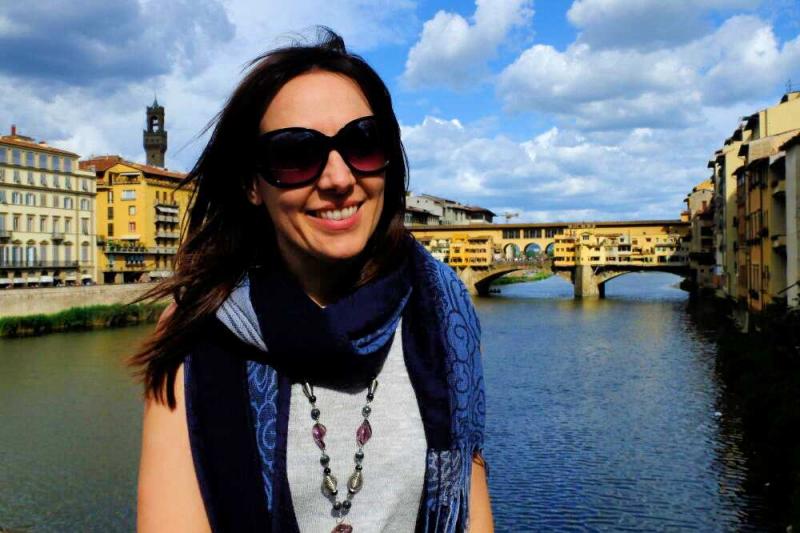Welcome to ITALY Magazine’s ‘Share Your Italian Story’ series. This month, we’re featuring the story of Aisling Sullivan, who moved from Ireland to Milan for love four years ago. Making the move in her late thirties, with a well-established life in Dublin, posed additional challenges. Now married and with a freelance career as Business English Coach and Content Creator, Aisling is also the happy owner, together with her husband, of a house in Tuscany’s Val d’Orcia, which they rent on Airbnb when not using it themselves.
Here Aisling shares the “joys, excitement, stresses and strains” of moving to and living in Italy.
- What prompted you to move to Italy?
Amore! I met my future Italian husband at a language exchange event in a Dublin pub. I’d been studying Italian as a hobby and Dario was in Dublin on a two-week course to improve his English for work. After a year of flying back and forth from Dublin to Milan, it was time for one of us to make a move. Dario had a permanent job in Milan while I was freelancing in Dublin. I’d just finished a big contract so it made more sense for me to be the one to move - I had less to lose if things didn’t work out. So, I made the difficult decision to leave my well-established Dublin life behind and begin a new one in Milan… and 4 years later, I’m still here!

[Aisling with her husband Dario at Milan's Teatro alla Scala.]
- Where have you relocated to and why did you choose that particular part of Italy?
I didn’t choose to live in Milan; choosing Dario meant Milan by default. But now we actually live between two places. Last year we made an impulsive decision to buy a house in Monticchiello which is situated in the beautiful UNESCO world heritage site of Val d’Orcia in Tuscany. We’re both self-employed now so we have the flexibility to work remotely, and when we’re not using the house ourselves, we rent it out on Airbnb. So, we really have the best of both worlds; the hustle and bustle of Milan and in sharp contrast, the tranquil rolling Tuscan hills. Recently, I saw that ‘Under the Tuscan Sun’ had been added to Netflix; I hadn’t seen it in years so we put it on and halfway through the film, we both jumped up simultaneously and gasped ‘that’s the road to our house!’ One of the scenes featured the iconic Tuscan curves and cypress trees in a little spot of heaven that we now call our home.
- What was most challenging to adjust to in your new life in Italy?
There were many challenges, but the biggest was changing career. In Ireland, I worked in the field of Opera, Theatre & Culture; now I’m a Business English Communications Coach, Content Creator and I also teach for the University of Milan. Basically, I had to reinvent myself at the same time as adjusting to a much bigger city and moving in with Dario (we had never lived together before). I had to start my freelance business from scratch; making contacts and learning the Italian business culture as I went along. Doing business in Milan is very different from Dublin - the experience has definitely made me toughen up. I think if you can survive in Milan you can survive anywhere! There is a saying here which sums it up well: ‘Chi va piano non è di Milano’ (Those who go slowly are not from Milan).

[Aisling in Desenzano del Garda.]
- How have you coped with the language?
I had a good grasp of the language before I moved here. I’d studied at the Istituto Italiano di Cultura in Dublin and they had awarded me two bursaries to study in Florence for a month each time, which was a fantastic experience. But nothing really prepares you for being thrown in at the deep end. Understanding a group of Italians all talking over each other is no mean feat. In the early days, after a night out with Dario’s friends, I would be utterly exhausted from the intense concentration needed to keep up. It also takes time to learn the ‘non-text book’ colloquial expressions and dialect which are commonly used in spoken Italian. Over time it got easier and a social night out didn’t seem like climbing Mount Everest anymore! I still have some difficulty with legal or bureaucratic Italian. The process of buying a house was quite stressful as I had to learn the jargon as we went along. And a conversation with my commercialista (tax consultant) is never a walk in the park either!
- Have you made friends where you live now? Overall, what was the transition like?
As many foreigners will say, Milan is not an easy city for making friends. The Milanese are polite but also quite reserved. Milan is a ‘città di passaggio’ meaning that people come and go here (usually for business), so you can understand why the locals aren’t inclined to invest emotionally in getting to know people who may move on after a couple of years. All my friends here are Dario’s friends, with the exception of a few Irish friends I’ve made through the Irish Business Network.
Monticchiello, on the other hand, is the total opposite. When we bought the house in this tiny medieval borgo, the locals couldn’t have been friendlier. It has a population of fewer than 230 people so there is a great community spirit. We felt so welcomed, which is one of the reasons we love it so much there.
So, what was the transition like? I miss my friends from home a lot. It was one of the biggest sacrifices. I left Dublin in my late thirties so I had a very established social life and a close circle of friends. I’m trying hard to hang on to those relationships; I’ve read too many stories of expats who fall between two stools - they lose touch with their friends from home but haven’t quite found the same connections in their new country - so I’m determined not to let that happen to me. Of course, it’s never hard to persuade my friends to hop on a plane to Italy, so that helps!

[The garden of Villa I Girasoli, Aisling and Dario's house in Monticchiello in Tuscany's Val d'Orcia. When not using it themselves, they rent it out on Airbnb.]
- What are the aspects of Italian culture and lifestyle you love the most?
Where do I begin? The elegance, style, weather, food, wine... but above all, the thing I love the most about living here is the diversity. Before the unification of Italy in 1861, the country was made up of numerous kingdoms and this legacy is still evident today. Each region is culturally different, with its own cuisine, traditions and even language (there are about 34 dialects spoken in Italy). Italians are very proud of their origins and when I find myself in the company of a Sicilian, a Roman and a Neapolitan, for example, I have the impression that they are almost different nationalities and the conversation is never dull.
The variety of cities and landscapes here is incredible and it would take a lifetime to explore them all. In little over an hour from Milan, I can be in the snow-covered Alps or at the stunning lakes of Como or Maggiore, or in the fairytale village of Grazzano Visconti. Changing region is like changing country, so every weekend can feel like a holiday if you make the effort to get out and about. I also adore the coffee culture and I can’t resist the old-world elegance of historical cafes like Savini in Milan, Caffè Gilli in Florence or Caffè Fiorio in Turin (I take my espresso standing at the bar like the locals, otherwise I’d need to remortgage my house to sit down and pay for table service!).
- What are the aspects of Italian culture and lifestyle that drive you crazy?
Without a doubt, No. 1 is the bureaucracy. Italians are masters at making a 3 step process into a 10 step process. When I’m on the verge of tears with frustration, I think all the prosecco in Veneto isn’t worth the trauma of dealing with this! Another thing I find irritating is the rigid lunchtime. While I love Italian food culture, I also think Italians can be ‘slaves to the table’ with their overly strict rules. In Ireland, we can have lunch at any time (a late lunch at 3 pm is not uncommon). In Italy, lunch is at 1 pm - non-negotiable! Outside the main cities, restaurants generally close between lunch and dinner, so you don’t have the flexibility to have lunch whenever you like. Also, Italians expect every meal to be high quality; they live to eat, while I eat to live. Being Irish, deep down we still carry the legacy of the devastating Famine which makes us really grateful to have any food at all. When it comes to making lunch, I’d be happy to chuck a slice of cheese between two slices of bread but for Dario, this is totally unacceptable (I usually resolve these disagreements by threatening to put pineapple on my next pizza!).
Other things that drive me crazy? Some honourable mentions go to: frequent public transport strikes, the overly complicated tax system, crazy traffic, the national obsession with taking your temperature if you have a sniffle, and fictitious ailments like ‘colpo d’aria’ (literally a ‘hit of air’ - your guess is as good as mine!?)

[A room at Villa I Girasoli, Aisling's home in Tuscany's Val d'Orcia.]
- Apart from friends and family, are there any factors that make you homesick?
I always feel a bit homesick around Halloween (its origins are actually Irish and not American as many Italians falsely believe). When my sister and I were kids we always had a Halloween party so I’ve really fond memories of this time of the year. It’s not an Italian tradition, although there is a nod to it with the cute ghost and pumpkin shaped cookies that you can find in the local Pasticcerias.
- What’s your experience of the ex-pat community?
When I first moved here, I got in contact with the Irish Business Network Italy. My first event was the Irish Ambassador’s Christmas reception, which was a great opportunity to get advice from my fellow Irish, some of whom have been living here for over 20 years. I think it’s really important to seek out people who understand your own culture and can offer support. There is a network aperitivo every couple of months which I always try to get to.
- Tell me about any goals or desires you have for your new life in Italy.
To see more of the country. Dario has shown me so many beautiful places I never even knew existed before moving here, like Pitigliano, Gubbio and Urbino for example, but there is still lots more of ‘il bel paese’ left to discover. We may also relocate to Tuscany full time in the future and we are currently hatching a plan for a new Italo-Irish business - watch this space :)

[Aisling in Tuscany.]
- What advice would you give to someone thinking of making the move?
Be dedicated to learning the language, especially if you are considering moving somewhere like rural Tuscany as not everyone can speak English. Don’t rely solely on expats for socialising. If you are finding it hard to meet Italians, try volunteering for a charitable organisation such as Progetto Arca, where you can meet a variety of people, practice your Italian and do some good at the same time.
Research your job prospects well before making the decision to move. If your career is important to you, you may not be willing to make it the trade-off. It can be very difficult to break into certain industries here without contacts, and of course, there is the added challenge of working through a second language.
Accept that you will lose the equivalent of at least 5 working days per year navigating bureaucratic issues; be that queuing for half a day to renew your ‘Tessera Sanitaria’ or making your 4th trip to the ‘Comune’ because each time you were missing a document that nobody told you to bring in the first place. We all have our horror stories! Bureaucracy is ingrained in Italian culture, so be prepared.
If you fell in love with Italy while on holiday, be aware that the rose-tinted glasses will get fogged up a little when you move here. Holidaying here and the reality of living here can be worlds apart. I laugh when my friends at home say they picture me sitting in a piazza sipping coffee all day; while I don’t deny this does happen on occasion, it’s usually far from the truth. Often, a more accurate image would be me squashed like a sardine on the metro in 38-degree heat.
If moving to Italy is your dream, then do it! It’s an incredible journey which is unique to all of us. And no matter if you stay for two years or twenty, your life will be enriched by the experience.
Thanks, Aisling, for sharing your story with ITALY Magazine readers.
Follow Aisling's Italian adventures on Instagram, and on Facebook.








